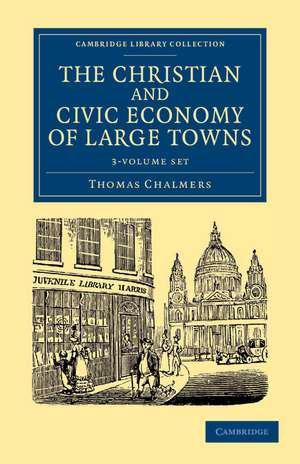The Christian and Civic Economy of Large Towns 3 Volume Set: Cambridge Library Collection - British and Irish History, 19th Century
Autor Thomas Chalmersen Limba Engleză Quantity pack – 26 iun 2013
Din seria Cambridge Library Collection - British and Irish History, 19th Century
-
 Preț: 275.77 lei
Preț: 275.77 lei -
 Preț: 357.62 lei
Preț: 357.62 lei - 19%
 Preț: 725.60 lei
Preț: 725.60 lei -
 Preț: 355.86 lei
Preț: 355.86 lei - 23%
 Preț: 1279.99 lei
Preț: 1279.99 lei -
 Preț: 313.87 lei
Preț: 313.87 lei - 23%
 Preț: 1081.79 lei
Preț: 1081.79 lei - 23%
 Preț: 2443.23 lei
Preț: 2443.23 lei -
 Preț: 202.90 lei
Preț: 202.90 lei -
 Preț: 276.01 lei
Preț: 276.01 lei -
 Preț: 275.77 lei
Preț: 275.77 lei -
 Preț: 407.56 lei
Preț: 407.56 lei -
 Preț: 331.14 lei
Preț: 331.14 lei -
 Preț: 248.84 lei
Preț: 248.84 lei -
 Preț: 330.16 lei
Preț: 330.16 lei -
 Preț: 519.83 lei
Preț: 519.83 lei -
 Preț: 421.20 lei
Preț: 421.20 lei -
 Preț: 370.01 lei
Preț: 370.01 lei -
 Preț: 278.22 lei
Preț: 278.22 lei - 19%
 Preț: 477.33 lei
Preț: 477.33 lei -
 Preț: 422.16 lei
Preț: 422.16 lei -
 Preț: 278.99 lei
Preț: 278.99 lei -
 Preț: 248.28 lei
Preț: 248.28 lei -
 Preț: 277.07 lei
Preț: 277.07 lei -
 Preț: 287.73 lei
Preț: 287.73 lei -
 Preț: 338.14 lei
Preț: 338.14 lei - 19%
 Preț: 596.21 lei
Preț: 596.21 lei -
 Preț: 375.10 lei
Preț: 375.10 lei -
 Preț: 353.31 lei
Preț: 353.31 lei -
 Preț: 366.74 lei
Preț: 366.74 lei -
 Preț: 368.10 lei
Preț: 368.10 lei -
 Preț: 252.15 lei
Preț: 252.15 lei -
 Preț: 442.83 lei
Preț: 442.83 lei -
 Preț: 330.93 lei
Preț: 330.93 lei -
 Preț: 280.17 lei
Preț: 280.17 lei -
 Preț: 222.36 lei
Preț: 222.36 lei -
 Preț: 368.69 lei
Preț: 368.69 lei -
 Preț: 278.61 lei
Preț: 278.61 lei -
 Preț: 371.20 lei
Preț: 371.20 lei -
 Preț: 522.33 lei
Preț: 522.33 lei -
 Preț: 369.62 lei
Preț: 369.62 lei -
 Preț: 519.66 lei
Preț: 519.66 lei - 19%
 Preț: 533.47 lei
Preț: 533.47 lei -
 Preț: 465.38 lei
Preț: 465.38 lei -
 Preț: 467.33 lei
Preț: 467.33 lei -
 Preț: 240.12 lei
Preț: 240.12 lei
Preț: 627.46 lei
Preț vechi: 740.57 lei
-15% Nou
Puncte Express: 941
Preț estimativ în valută:
120.06€ • 125.36$ • 99.37£
120.06€ • 125.36$ • 99.37£
Carte indisponibilă temporar
Doresc să fiu notificat când acest titlu va fi disponibil:
Se trimite...
Preluare comenzi: 021 569.72.76
Specificații
ISBN-13: 9781108062398
ISBN-10: 1108062393
Pagini: 1156
Dimensiuni: 139 x 217 x 69 mm
Greutate: 1.4 kg
Editura: Cambridge University Press
Colecția Cambridge University Press
Seria Cambridge Library Collection - British and Irish History, 19th Century
Locul publicării:Cambridge, United Kingdom
ISBN-10: 1108062393
Pagini: 1156
Dimensiuni: 139 x 217 x 69 mm
Greutate: 1.4 kg
Editura: Cambridge University Press
Colecția Cambridge University Press
Seria Cambridge Library Collection - British and Irish History, 19th Century
Locul publicării:Cambridge, United Kingdom
Cuprins
Volume 1: Preface; 1. The advantage and possibility of assimilating a town to country parish; 2. On the influence of locality in towns; 3. Application of the principle of locality to the work of a Christian minister; 4. The effect of a locality in adding to the useful establishments of a town; 5. On church patronage; 6. On church patronage; 7. On church offices; 8. On Sabbath schools. Volume 2: 9. On the relation that subsists between the Christian and the civic economy of large towns; 10. On the bearing which a right Christian economy has upon pauperism; 11. On the bearing which a right civic economy has upon pauperism; 12. On the present state and future prospects of pauperism in Glasgow; 13. On the difficulties and evils which adhere even to the best condition of Scottish pauperism; 14. On the likeliest means for the abolition of pauperism in England; 15. On the likeliest parliamentary means for the abolition of pauperism in England; 16. On the likeliest parochial means for the abolition of pauperism in England. Volume 3: Preface; 17. On the wages of labour; 18. On the effect of a poor-rate; 19. On savings banks; 20. On the combinations of workmen for the purpose of raising wages; 21. The same subject continued; 22. On certain prevalent errors and misconceptions; 23. On the effect which the high price of labour in a country has upon its foreign trade; 24. On mechanical schools.
Descriere
This three-volume work (1821–6) outlines the ways in which an urban industrial society can become self-sufficient through Christian communalism.
